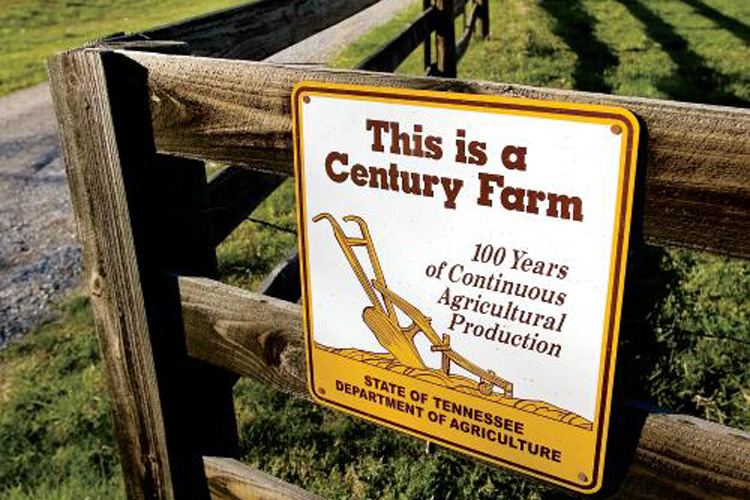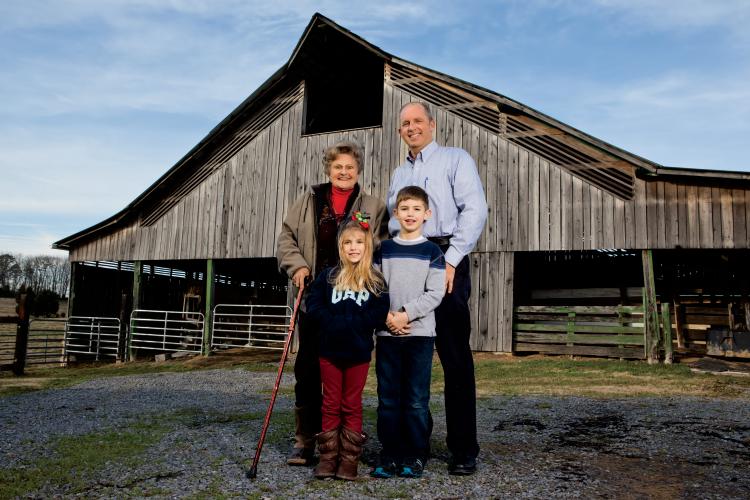Home > Tennessee > Tennessee Farm to Table > Farmland Legacy Partnership Works to Keep Tennessee’s Farms in Business
Farmland Legacy Partnership Works to Keep Tennessee’s Farms in Business
In partnership with: Tennessee Department of Agriculture

Rolling Acres Farm has been in Lucille Ryan’s family for seven generations. At 84, she is turning it over to her son, who will manage the beef cattle operation. And she hopes her grandson will one day be the ninth generation on that land in Hawkins County.
So does the Tennessee Farmland Legacy Partnership, a group of a dozen government, university and nonprofit agencies working to raise awareness about the state’s agricultural history and the importance of farmland to its future. Tennessee has 77,300 farms, according to the National Agricultural Statistics Service, but between 2000 and 2010, the state lost an average of 1,000 family farms and 95,000 acres to other uses each year.
The costs are real – less land for food production, fewer rural jobs and diminished scenic beauty, says Joe Gaines, assistant commissioner for the Tennessee Department of Agriculture.
“People like to be able to drive 20 minutes and see the country. We have green fields and trees and cows and barns. It is part of our heritage,” Gaines says. “Farmland has a value that should be considered within the development process.”

Making It Work
Five state departments and two federal agencies, plus Cumberland Region Tomorrow, the MTSU Center for Historic Preservation, The Land Trust for Tennessee, the Tennessee Farm Bureau Federation and UT’s Institute of Agriculture came together as the Farmland Legacy Partnership in February 2010. The Land Trust acquires easements on farms to permanently protect the land.
The MTSU center runs the Century Farms program, which certifies and recognizes Tennessee farms that are 100, 150 and 200 years old. As of December 2011, Tennessee had more than 1,400 Century Farms, says Caneta Hankins, director of the program.
Recognition helps boost awareness and agricultural tourism, but a key to farmland preservation is making farming itself profitable, Gaines says.
To that end, the Tennessee Agricultural Enhancement Program offers grants to help farmers pay for hoop houses, irrigation and hay barns. More than 4,000 hay barns were built in the last five years, generating 4,500 jobs in rural Tennessee, Gaines says. Farmers had to match the grant amount with their own funds.
He cites an October 2011 study by the University of Tennessee that found every $1 invested in agriculture generates $3.89 in additional economic impact.
Going Local
Efforts to preserve Tennessee’s farmlands dovetail with increased interest in locally sourced food.
“I do think more people appreciate local foods and local farms,” Gaines says.
The Century Farms program sees a rush of new applications early in the year from early 20th century farms hitting their centennial year, Hankins says.
To qualify, farms must have at least 10 acres of the original founders’ land, been in the family continuously for at least 100 years, produce at least $1,000 a year in farm income and have at least one owner who is a Tennessee resident.
Rolling Acres meets those requirements quite easily. The farming operation began in Rogersville in 1789 and through generations produced traditional East Tennessee crops as well as honey, lye soap, chicken, turkey and eggs. For much of the 20th century, the farm was a large-scale dairy operation run by Ryan’s father, the founders’ great-great grandson. Lucille Ryan’s late husband switched to beef cattle in 1989. Rolling Acres also produces corn, wheat and hay for its cattle.
“We tried everything like most farmers do,” she says.
The sense of family heritage has been one constant.
“I would like it to be passed down like this, as a farm,” Ryan says. “It is important to me.”



